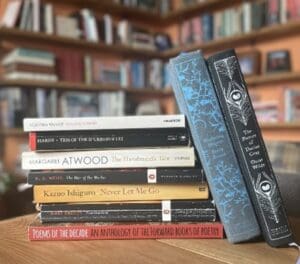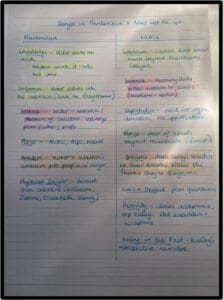What and How to Revise for your Prose exam (Edexcel A Level English Literature Component 2)
The prose exam may well occupy a disproportionate amount of your revision time as it is only worth 20% of your A Level, yet two novels can take a considerable amount of time to revise well. It’s important to use this time effectively.
Before you start, make sure you know exactly what the assessment objectives for this question are. You are assessed for:
- AO1: your ability to articulate an informed, well written essay; your use of relevant concepts and terminology.
- AO2: your ability to analyse the ways meanings are shaped in texts.
- AO3: your ability to understand the relevance and significance of relevant context
- AO4: your ability to make connections between texts

Prose Revision Tips
- In an ideal world, you would have read your two novels at least three times before you sit the exam; once in the summer before you started your A Levels, once in class and at least once for revision. However, I’ve been teaching long enough to know that this is a highly unlikely dream for most students! Try to read the novels as many times as you can. If you are a slow reader, you could try listening to the audiobook or listening to it on YouTube (you can speed up the pace of this if it feels a bit slow). If possible, try to follow along with the text as you listen as you need to know your way around the actual book in the exam.
- Film versions of the novels can be helpful to cement the story and characters, but you need to approach these with caution as some films are very far from the text. For Frankenstein, for example, there are numerous films but none, to my knowledge, stick closely to what Shelley actually wrote and most are pretty ridiculous.
- Identify what the main events are and know where to find them in the text. These ‘big events’ are likely to be useful evidence for a range of questions. What you want to be able to do in the exam is find the best evidence as quickly as possible, so try to learn by heart where these significant events happen (e.g. In The Handmaid’s Tale, know the chapters where the Ceremony and the Particicution takes place and in which chapter they go to Jezebels).
- As you read, try to reduce each chapter to a very brief summary or caption (think about the way Friends episodes are named: The One where…). Put these summaries on revision cards with the chapter number on the back and keep testing yourself. Spread them out on the floor and try to put them in order.
- Identify the main themes in each novel and then see which feature in both of your novels – these are the ones to revise really thoroughly. Make big mind maps or columned tables where you note down the ways each theme is evident in each book. Don’t do separate ones for each novel as you do not want to consider the novels in isolation as this is an AO4 question. When you’ve done this, use highlighters to link points which would go well together in an essay.
- Use the theme plans you have made in number 5 to do lots of essay plans. Think about how you would narrow down the ideas you have collected into one thesis and then start collecting evidence from the novels to support each point. Try to take your evidence from different places in the novels as examiners like to see you ranging around the text. Look for motifs and evidence that is typical of the writer’s style as it shows better understanding of the writer’s craft to comment on patterns rather than too much about individual words or phrases. Your plans should also include relevant links to context.

- Get a list of past questions and do some timed essays. All but the most recent exam papers are on the board’s website for you to access, or your teacher may be able to give you a list. It’s unlikely these particular questions will come up again, but that doesn’t mean the examiners won’t use synonyms in their steers, so it’s definitely worthwhile practising with some of these questions. For example, one of my students recently planned for an essay on isolation which she was then able to use when the mock exam question was about being trapped. It’s really important to practise responding in the time allowed in the exam (for this component, you will have 1 hour 15 minutes) to get your brain used to thinking quickly; to get used to finding quotations speedily; and to be able to write fast. Hand these in and ask your teacher to mark them. If they won’t, I will.
- It is not necessary to learn quotations off by heart as it’s an open book exam but, if you are good at doing this (or bad at remembering where quotations are), it can save you time in the exam. Try the ‘look, cover, write, check’ method you used for learning spellings at primary school.
- Read around your books. Although AO5 is not assessed for this component, reading what critics, or the author’s themselves, have said about the novels can really help to develop your understanding and form thesis ideas. This can also help you with AO3 as they often reveal factors which influenced the writers.
- As with the Drama unit, you must write about the way contexts might have affected your texts, so make sure you know the relevant social, cultural, literary, biographical and historical contexts. Try to link this information to the writer’s intentions in writing their novels so that you don’t just tack it on in your essays. Make yourself colourful revision posters for both texts. Remember that you can make links (AO4) between the contexts too – you might not think Mary Shelley’s world had much in common with Margaret Atwood’s, but both are warning their readers about different contemporary concerns.
- Don’t think that all revision has to be done locked away in your bedroom. Talking revision is a very helpful ways of testing your knowledge and ideas, being reminded of useful evidence and getting you used to presenting an argument – which is essentially what you will be doing in the exam.
I make no apology for repeating the advice from the last two articles:
- make a list of anything you don’t understand to check with your teacher.
- check that the book you are revising from is the same edition as the one you will use in the exam (this is particularly important if your text is Frankenstein as there are significant differences between the 1818 and 1831 editions)

